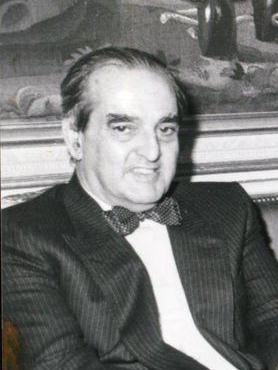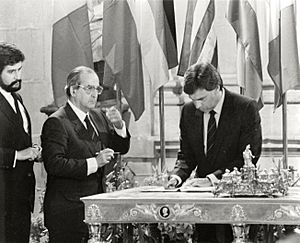Fernando Morán (politician) facts for kids
Quick facts for kids
Fernando Morán
|
|
|---|---|

Morán in 1983
|
|
| Minister of Foreign Affairs | |
| In office 2 December 1982 – 4 July 1985 |
|
| Prime Minister | Felipe González |
| Preceded by | José Pedro Pérez-Llorca |
| Succeeded by | Francisco Fernández Ordóñez |
| Personal details | |
| Born |
Fernando Morán López
25 March 1926 Avilés, Spain |
| Died | 19 February 2020 (aged 93) Madrid, Spain |
| Political party | People's Socialist Party (formerly) Spanish Socialist Workers Party |
| Alma mater | London School of Economics |
Fernando Morán (born March 25, 1926 – died February 19, 2020) was an important Spanish diplomat and politician. He worked as the Minister of Foreign Affairs for Spain from 1982 to 1985. This was during the first government led by Prime Minister Felipe González.
After finishing his studies in Madrid, Paris, and London, Morán became a diplomat. He was also one of the people who started the Socialist Party of the Interior in 1967. This party later became known as the People's Socialist Party in 1974.
Contents
Early Life and Education
Fernando Morán was born in Avilés, a city in Asturias, Spain, on March 25, 1926. He studied law and economics at university. He also attended special institutes in Paris and the London School of Economics in London to learn more about international relations.
A Career in Diplomacy and Politics
Morán spent many years as a diplomat, which means he represented Spain in other countries. He worked in different places like Buenos Aires (Argentina), Pretoria (South Africa), and Lisbon (Portugal). He was also a consul general in London, helping Spanish citizens there. Later, he became a director for Spain's foreign policy in Africa and Asia.
In 1974, Morán decided to get involved in politics. He joined a group called the Popular Socialist Party. He helped set up a group in Salamanca during the time Spain was ruled by Franco. After that, he became a member of the Socialist party and was their main expert on foreign policy. In 1978, people in Asturias elected him to be a senator, which is a type of lawmaker.
Serving as Foreign Minister
Morán became the Minister of Foreign Affairs in the first government of Prime Minister Felipe González. He held this important job from 1982 until July 4, 1985. He was removed from his position because he did not agree with Spain continuing to be a member of NATO, a military alliance. Francisco Fernández Ordóñez took over his role.
Work After Being Minister
From 1985 to 1987, Morán represented Spain at the United Nations. This is a big international organization where countries work together.
In 1987, he became a leader for the Socialist party group in the European Parliament. This is where elected representatives from different European countries make laws for the European Union. He served there for many years, until 1999. During his time, he led a committee that dealt with important institutional matters.
Morán's Important Views

As Foreign Minister, Fernando Morán played a big part in helping Spain join the European Union. He worked hard to negotiate the terms for Spain's entry. He also successfully negotiated the Brussels Agreement for Spain in 1984.
However, he strongly disagreed with Spain staying in NATO. He believed Spain should not be part of this military group. Morán was also known for his support of Arab countries in his foreign policy decisions.
His Writings
Fernando Morán was also a writer. He wrote several novels, poetry, and books where he discussed literature. One of his books, Luz al fondo del túnel (Light at the End of the Tunnel), was published in 1999. In 2002, he published his life story, or biography, called Palimpsesto: a modo de memorias.
Later Life and Death
Fernando Morán was married and had three children. He passed away on February 19, 2020, in Madrid, Spain.
See also
 In Spanish: Fernando Morán López para niños
In Spanish: Fernando Morán López para niños

